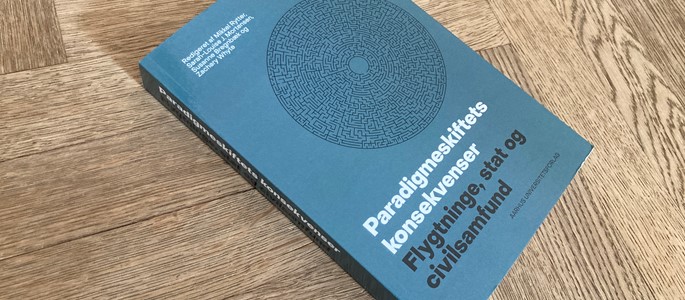The paradigm shift has significant consequences for both refugees, the state, and civil society
New Danish book sheds light on the multifaceted consequences of the paradigm shift, both now and in the future
The book is published in Open Access and can be purchased for free HERE. You can also order it in printing same place. Only available in Danish.
In a new Danish anthology, "Consequences of the Paradigm Shift – Refugees, State, and Civil Society," it is emphasized how the paradigm shift in Danish politics not only affects the lives of the refugees involved but also is a more fundamental change that has altered the relationship between refugees, the state, and civil society.
A group of Danish researchers – with backgrounds in sociology, ethnology, psychology, law, and anthropology – examine the paradigm shift through some of the many intended and unintended consequences for refugees, professionals, volunteers, and the relationship between citizens and the welfare society. These consequences, unfolding in all their complexity, are now becoming visible and understandable.
"Hence, the paradigm shift is a reality that will continue to have consequences for years to come."
– quote from the book
The book consists of 14 research-based chapters that focus on the implications of the paradigm shift on various levels of Danish society. This includes both the refugees directly and indirectly affected by the legal changes and the many front-line workers in local and national organizations – including educators, caseworkers, and police officers – who are responsible for implementing and enforcing the legal changes. Furthermore, it discusses how the paradigm shift impacts refugees' access to the job market and their relationships with civil society.
Everyday life and separating family members
By using examples from everyday life – like a Syrian woman considering whether to buy a washing machine when she does not know if she will keep her residence permit in Denmark – the uncertainty and fragility surrounding refugees' sense of belonging in Danish society are illustrated. This uncertainty affects the daily life and complicate efforts to build a future, even though their formal protection is (temporary) secured.
"If the consequences of frequent reassessments and short residence permits under the paradigm shift are observed as a loop, life with a valid residence permit appears as a recurring, repeating asylum procedure that brings residence uncertainty, future uncertainty, and individual powerlessness into the everyday lives of formally protected refugees."
– quote from the book
Furthermore, the uncertainty is accentuated when family members receive different residence permits in Denmark. Some families are forced into difficult situations where they have to choose between keeping the family together or securing residence permits for individual family members in Denmark. In the case of Salma, who faced the choice of, on one hand, encouraging her son of military service age to apply for independent residency, knowing it could result in never seeing him again if her own residency permit is revoked. On the other hand, if Salma insists on keeping the family together, she risks her son's safety in case of deportation.
Labor market and welfare society
Another addressed problem is the contrast between the expectation for refugees to participate in the welfare society – by following integration programs and obtaining employment – while they must be prepared to have their residency permits revoked for eventual return. This results in concerns among employers about hiring and training employees with a refugee background due to the risk that the person may lose their residence permit. Although, the refugees have the right to work and stay in Denmark. Thus, the interrelation between migration and labor market regimes creates overlapping forms of uncertainty. These forms of uncertainty encompass existential, legal, social, and economic dimensions, affecting most aspects of refugees' everyday lives.
The paradigm shift affects us all
This new anthology underscores that the new deportation agenda that came with the paradigm shift has a series of unintended and unfortunate consequences. It contributes to the narrative that the paradigm shift creates massive uncertainty for refugees both for the refugees directly and indirectly involved. With the paradigm shift, Danish politicians have actively introduced temporariness and uncertainty to discourage refugees from coming to Denmark and to motivate those already in Denmark to return. This uncertainty and unpredictability permeate and shape all aspects of refugees' lives and daily routines. However, the paradigm shift does not just affect the refugees involved; it has significant consequences for our society as a whole. Therefore, this book underlines that the consequences of the paradigm shift affect us all.
Sidsel Larsen is a sociologist and was one of the authors to the report "You can never feel safe" from Danish Institute for Human Rights about revoking residence permits for Syrian refugees, 2022. She has recently started as a volunteer counsellor at Refugees Welcome.
As a member you
support our fight against
the paradigm shift


